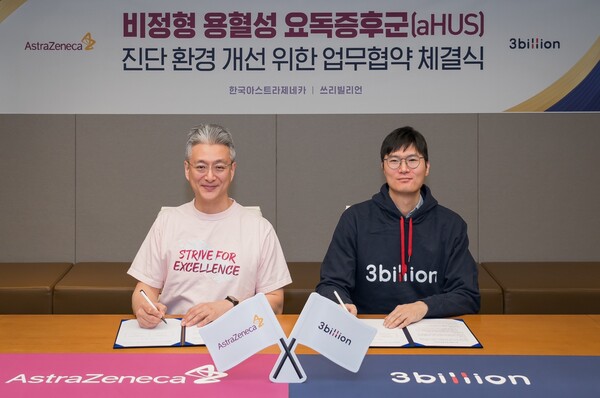AstraZeneca Korea and 3billion, a rare disease specializing healthcare firm, have signed a partnership to cut genetic testing time for atypical hemolytic uremic syndrome (aHUS) in half, aiming to speed up treatment access for patients facing the disease’s rapid progression.
The announcement sent 3billion’s stock up 26.81 percent to close at 7,190 won on Monday.

The collaboration will reduce the turnaround for aHUS genetic testing from 4–6 weeks to 2–3 weeks, with AstraZeneca Korea leveraging 3billion’s whole-exome sequencing (WES) and whole-genome sequencing (WGS) services.
3billion, a genetic diagnostics company specializing in rare diseases that listed on Kosdaq in November, said its AI-powered technology, EVIDENCE, can analyze up to 5 million genetic variants per patient with 99.4 percent accuracy, identifying aHUS-related mutations in under five minutes—a system the company claims is three times faster than conventional methods.
Genetic test results will also serve as key evidence for insurance reimbursement of C5 inhibitors, the standard treatment for aHUS. AstraZeneca Korea currently supplies Soliris (eculizumab), administered every two weeks, and Ultomiris (ravulizumab), given every eight weeks, both of which are covered under Korea’s national insurance system for eligible patients.
aHUS is a rare and life-threatening disorder caused by uncontrolled complement system activation, leading to red blood cell destruction and blood clots that can damage multiple organs. Diagnosis has traditionally relied on differential testing, but 60 percent of patients have identifiable genetic mutations, making genetic testing a definitive diagnostic tool.
“We are committed to improving the treatment environment with a patient-centered approach, from diagnosis to reimbursement,” said Chon Se-hwan, Country President of AstraZeneca Korea. “By reducing testing times, we hope patients receive treatment without unnecessary delays.”
Keum Chang-won, CEO of 3billion, added, “Speed is critical in rare disease treatment. Through this partnership, we are ensuring that aHUS patients get an accurate diagnosis before it’s too late.”
Related articles
- AstraZeneca’s Ultomiris reimbursed for atypical hemolytic uremic syndrome in Korea, but access remains limited
- Tagrisso expands indication for unresectable stage-3 EGFR-mutant lung cancer patients
- AstraZeneca seeks deeper partnerships with Korean biotechs, calls for government support to boost innovation
- AstraZeneca Korea launches ‘Lung Cancer Zero’ campaign to promote early detection in women
- 3billion eyes US market in rare genetic disease diagnostics post-IPO
- AstraZeneca Korea boosts efforts for IPC recertification, emphasizing R&D and innovation
- AstraZeneca shares latest insights on rare genetic diseases
- AstraZeneca’s asthma drug Tezspire hits market access hurdle in Korea despite launch
- AstraZeneca’s PPI Nexium still leader despite P-CAB challenge in GERD treatment
- Korea eases aHUS rules, giving AZ’s Ultomiris a clear path in 2026

